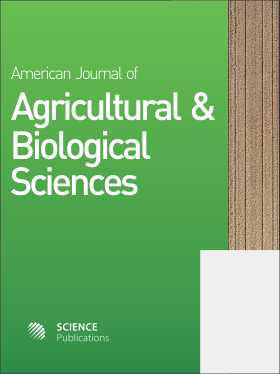ASCORBIC ACID FOLIIAR SPRAY COUNTERACTING EFFECT OF SALINITY ON GROWTH, NUTRIENTS CONCENTRATIONS, PHOTOSYNTHESIS, ANTIOXIDANT ACTIVITIES AND LIPID PEROXIDATION OF BEAN (PHASEULUS VULGARIS L.) CULTIVARS
- 1 Department of Plant Biochemistry, El Behouth Street, Dokki, Egypt
- 2 Department of Fertilization Technology, El Behouth Street, Dokki, Egypt
Abstract
A water culture experiment was carried out in the Department of Fertilization Technology at National Research Centre, Cairo, Egypt, to investigate the effect of Ascorbic Acid (AsA) foliar application and salinity stress (100 ppm and 100 mmoL NaCl) on growth, nutrients concentration and some biochemical parameters of two kidney bean (Phaseulus Vulgaris L.) cultivars. Salinity caused significant reduction in growth parameters (leaves and root dry weights) and some of biochemical parameters (nutrients concentration, photosynthesis pigment, Carbonic Anhydrase Activity (CAA), antioxidant enzyme activity Peroxidase (POD) and lipid peroxidation). The reduction effect on Paulista cultivar was higher than Nebraska cultivar at 100 mM NaCl salinity stress. Meanwhile, POD activity was increased under salt stress conditions. Lipid Peroxidation (LP) under 100 mmoL NaCl salinity was significantly increased. The two cultivars showed an increase in MDA content with NaCl salinity stress, but the increase in sensitive cultivars Paulista was higher than that in salt-tolerant Nebraska cultivar. Application of (AsA) not only mitigated the inhibitory effect of salt stress in both kidney bean cultivars, but also in some cases induced a stimulatory effect greater than that estimated in the control plants on growth parameters which were accompanied by marked increases in nutrients concentration and photosynthetic system (pigments and carbonic anhydrase activity). Ascorbic Acid (AsA) has been shown to be an essential antioxidant; agent may act as a scavenger of ROS for mitigating the injury on bio-membranes under salt stress. Therefore, this study suggested that (AsA) application may induce an adaptive response in kidney bean through stimulation of the antioxidant enzymes activities, photosynthesis processes and lower lipid peroxidation, in Nebraska relative to Paulista may contribute to salt tolerance mechanism in Nebraska.
DOI: https://doi.org/10.3844/ajabssp.2014.384.393

- 3,851 Views
- 4,101 Downloads
- 2 Citations
Download
Keywords
- Salinity Strss
- Antioxidants
- Ascorbic Acid
- Kidney Bean
